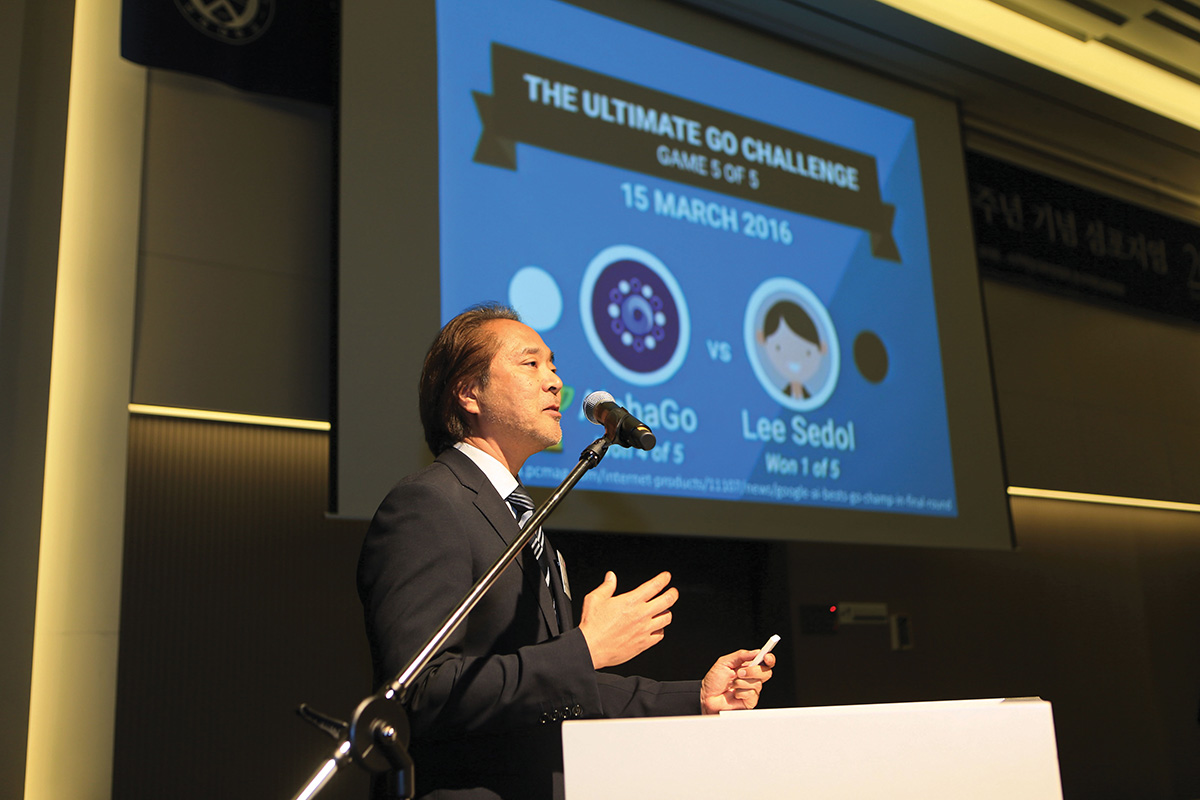Yonsei News
-
[YONSEI NEWS] Medical Studies Education in South Korea: Its Past, Present and Future
연세대학교 홍보팀 / news@yonsei.ac.kr2016-05-25 -
Medical Studies Education in South Korea:Its Past, Present and FutureOn March 24, the College of Medicine’s Department of Medical Studies Education hosted a symposium to mark its twentieth anniversary. The symposium’s main theme was “Challenges and Changes of Yonsei Medical Education”; several presentations were given regarding the past two decades of medical studies education at Yonsei and the future directions it should take.
 In the first session, “Twenty-First-Century Medicine Studies Education Innovation,” Vice Dean Robert Kamel of Duke-NUS Graduate Medical School in Singapore spoke on information changes in medical studies, along with some of the new discoveries and technologies in the field. He also discussed innovative curricular programs that reflect changes in the role of the doctor.The Yonsei School of Medicine began offering western-style medical education in 1885. Since its founding in 1996, the Department of Medical Studies Education has worked to promote specialization in the education field, collaborative studies with other departments and colleges, and evidence-based medical studies. Overall, the department has sought to bring innovation to the field of medical studies education.In 2004, the School of Medicine changed its curriculum, decreasing lecture hours while increasing experiential learning. In 2013, the school redefined its educational goals by emphasizing such areas as: Student-Centered, Results-Centered, Integrated Curriculum, and Research-Centered. The next year, a new Pass/Non-Pass grading system was introduced to foster cooperative team-based learning among students. Furthermore, the school introduced Doctoring and Medical Humanities (DMH) into the curriculum, shifting the emphasis from acquiring medical knowledge to promoting ethical professionalism and leadership.
In the first session, “Twenty-First-Century Medicine Studies Education Innovation,” Vice Dean Robert Kamel of Duke-NUS Graduate Medical School in Singapore spoke on information changes in medical studies, along with some of the new discoveries and technologies in the field. He also discussed innovative curricular programs that reflect changes in the role of the doctor.The Yonsei School of Medicine began offering western-style medical education in 1885. Since its founding in 1996, the Department of Medical Studies Education has worked to promote specialization in the education field, collaborative studies with other departments and colleges, and evidence-based medical studies. Overall, the department has sought to bring innovation to the field of medical studies education.In 2004, the School of Medicine changed its curriculum, decreasing lecture hours while increasing experiential learning. In 2013, the school redefined its educational goals by emphasizing such areas as: Student-Centered, Results-Centered, Integrated Curriculum, and Research-Centered. The next year, a new Pass/Non-Pass grading system was introduced to foster cooperative team-based learning among students. Furthermore, the school introduced Doctoring and Medical Humanities (DMH) into the curriculum, shifting the emphasis from acquiring medical knowledge to promoting ethical professionalism and leadership.
vol. 118
- vol. All
- vol. 1243
- vol. 1122
- vol. 125
- vol. 124
- vol. 123
- vol. 122
- vol. 121
- vol. 120
- vol. 119
- vol. 118
- vol. 117
- vol. 116
- vol. 115
- vol. 114
- vol. 113
- vol. 112
- vol. 111
- vol. 110
- vol. 109
- vol. 108
- vol. 107
- vol. 106
- vol. 105
- vol. 104
- vol. 103
- vol. 102
- vol. 101
- vol. 100
- vol. 99
- vol. 98
- vol. 97
- vol. 96
- vol. 95
- vol. 94
- vol. 93
- vol. 92
- vol. 91
- vol. 90
- vol. 89
- vol. 88
- vol. 87
- vol. 86
- vol. 85
- vol. 84
- vol. 83
- vol. 82
- vol. 81
- vol. 80
- vol. 79
- vol. 78
- vol. 77
- vol. 76
- vol. 75
- vol. 74
- vol. 73
- vol. 72
- vol. 71
- vol. 70
- vol. 69
- vol. 68
- vol. 67
- vol. 66
- vol. 65
- vol. 64
- vol. 63
- vol. 62
- vol. 61
- vol. 60
- vol. 59
- vol. 58
- vol. 57
- vol. 56
- vol. 55
- vol. 54
- vol. 53
- vol. 52
- vol. 51
- vol. 50
- vol. 49
- vol. 48
- vol. 47
- vol. 46
- vol. 45
- vol. 44
- vol. 43
- vol. 42
- vol. 41
- vol. 40
- vol. 39
- vol. 38
- vol. 37
- vol. 36
- vol. 35
- vol. 34
- vol. 33
- vol. 32
- vol. 31
- vol. 30
- vol. 29
- vol. 28
- vol. 27
- vol. 26
- vol. 25
- vol. 24
- vol. 23
- vol. 22
- vol. 21
- vol. 20
- vol. 19
- vol. 18
- vol. 17
- vol. 16
- vol. 15
- vol. 14
- vol. 13
- vol. 12
- vol. 11
- vol. 10
- vol. 9
- vol. 8
- vol. 7
- vol. 6
- vol. 5
- vol. 4
- vol. 3
- vol. 2
- vol. 1
- Show All
- COVER STORY
- YONSEI NEWS
- INTERNATIONAL RELATIONS
- RESEARCH FRONTIER
- SERVANT LEADERSHIP
- YONSEI PEOPLE
- ABOUT YONSEI
- GLOBAL LOUNGE
- YONSEI GALLERY